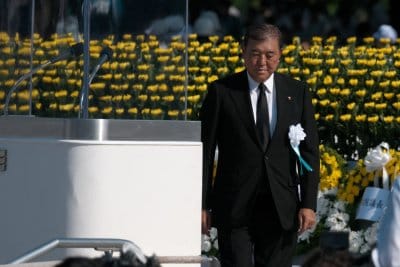Sept. 7 (UPI) — Japanese Prime Minister Shigeru Ishiba announced his resignation Sunday to avoid a split of his Liberal Democratic Party after recent election defeats.
“Today, I have decided resign from the position of President of Liberal Democratic Party,” Ishiba posted in a brief message on social media.
Ishiba, in a news conference carried by public broadcaster NHK, said he had decided to resign from the post now that negotiations with the administration of President Donald Trump over tariffs had ended.
“I thought a decisive division within the party could be created if the issue of an extraordinary presidential election continued to develop. That is not what I wanted,” Ishiba said in the news conference.
“I hope people will fully understand as I will continue fulfilling my duties during my remaining time in office.”
Ishiba instructed LDP Secretary-General Hiroshi Moriyama to begin preparations for a leadership election in line with party rules, according to NHK.
The announcement followed a bruising summer election in which Ishiba’s LDP and its junior coalition partner Komeito lost their majority in the upper house of parliament.
Projections ahead of the vote had warned the coalition was at risk of falling short, and final results confirmed the parties captured only 47 seats, three shy of the 50 needed to maintain control.
The setback deepened the LDP’s political troubles after earlier losses in the lower house, fueling speculation about Ishiba’s hold on power. NHK noted the results left the ruling party struggling to pass legislation without opposition support, raising the prospect of gridlock.
Ishiba, a former defense minister who became prime minister in 2024, had campaigned on strengthening Japan’s security posture and managing rising costs of living. But his government’s popularity waned amid economic pressures, and party heavyweights pressed him to step aside to clear the way for new leadership.
The resignation was heralded as a smart move to bolster party unity by members of Ishiba’s own party while Saito Tetsuo, the chief representative of coalition partner Komeito, called the announcement regrettable.
“I am deeply disappointed by this announcement of resignation. However, I understand it as an unavoidable decision to bring an early end to the confusion within the Liberal Democratic Party,” Tetsuo said in a post on social media.
“In order to minimize the political vacuum, and also to realize the promised tax cuts and benefits, I call on the Liberal Democratic Party to respond swiftly.”
Noda Yoshihiko, the head of the main opposition party, the Constitutional Democratic Party, also expressed concern about the country operating in a political vacuum while inflation grips Japan, NHK reported.
With Ishiba’s departure, the LDP will quickly move to initiate its formal leadership selection process. Under party rules, aspiring candidates must secure at least 20 endorsements from fellow LDP members in the Diet, the national legislature, to qualify.
The election will involve both LDP lawmakers and rank-and-file party members across Japan. If no single candidate achieves a majority in the first round, a run-off between the top two vote-getters will be held, this time giving equal weight to lawmakers and one vote per prefectural branch.
Once a new party president is chosen, the Diet will convene to endorse the next prime minister. Although the LDP has lost its majority in both chambers, its dominance in the lower house ensures that its nominee can secure the post.
Yet the absence of a decisive majority sets the stage for political instability, forcing the new leader to rely on cross-party cooperation to pass legislation or consider calling a general election for a fresh mandate.
